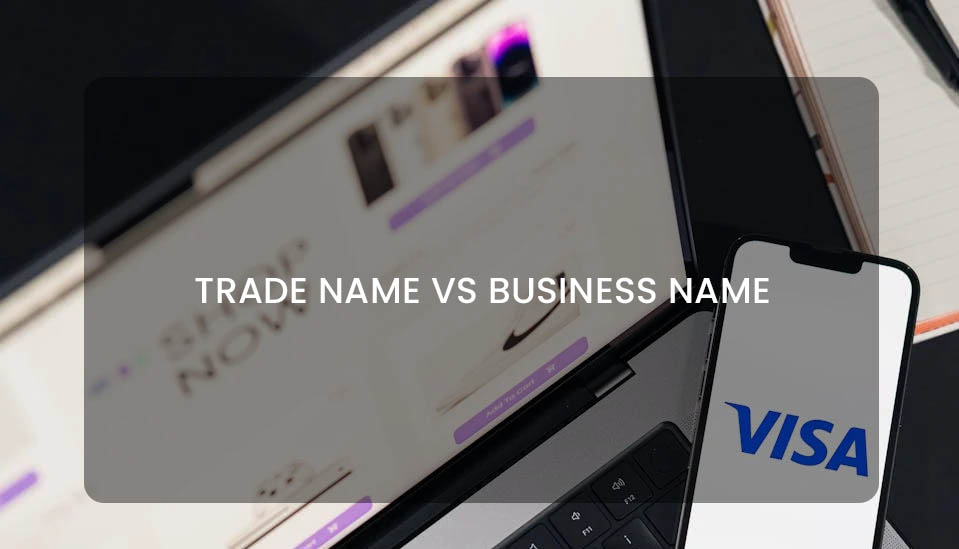
When you start an LLC or corporation, you’ll need to list your company’s name when you file paperwork with the state. This name will become your business’s official legal name. However, the business name doesn’t necessarily have to be the customer-facing name that you use. This is what the trade name is, or the DBA (doing business as) name. Knowing the difference between a trade name and a business name is important. Here’s what you need to know.
What Is a Business Name?
The business name is the legal name that your business filed with your state when you set up your LLC, corporation or other business structure.
The business name is the legal name under which your business is registered for taxes and official government purposes. It is important to have this name so you can start conducting business officially by hiring employees, providing services and getting the materials you need to start doing business.
Requirements of a Business Name
When you find the perfect business name to set up your company, you have to make sure that it isn’t already being used by another business in your state. Before filing all of the necessary business paperwork, you can place a hold on a name you want for a small fee in most states. However, your business won’t officially be formed with the name you’ve chosen until you file business formation documents.
It is necessary to search available names in the state where you’re filing. It’s always possible that your first choice will have been taken, so you should come prepared with a few backup options for your LLC or corporation.
What Is a Trade Name?
A trade name is the front-facing name that customers and clients know your business as. This is why it’s also called a DBA name—the name you’re “doing business as.” A lot of businesses will have their registered business name with the “LLC” or the “Inc.” dropped as their trade name. For example, the Trader Joe’s business name is Trader Joe’s Co., but their customer name will always be Trader Joe’s.
Filing a trade name does not establish a new business–a trade name is simply a nickname for the business you already have. Requirements vary by state and locality, but you’ll usually need to file a trade name if you’re using any name other than your LLC or corporation’s official legal name. Sole proprietorships and partnerships typically need to file a DBA if they’re using a name other than their own last names.
Benefits of a Trade Name
Having a trade name can be good idea if your trade name is easier for customers to say and remember. Although most people know what LLC or Inc. or Co. means, it can feel cumbersome at the end of a clever business name.
A trade name also does not have to be unique. If you have a really great name that you can’t use as a business name because it’s taken, you can find a way to use it as a trade name (as long as you aren’t infringing any trademark rights). Doing business as whatever name you feel is most memorable and catchy can be achieved, even if you have a different legal business name.
A trade name can also give you the freedom to try out new product or service lines under a different name without setting up a new company.
Registering a trade name also means you can accept payments that are addressed to either your legal business name or your company’s trade name. This makes it easier for clients and vendors because they don’t have to differentiate between your trade name and business name for payments.
Drawbacks of a Trade Name
The fact that a trade name is typically not unique can cause problems for your business if someone chooses to use the same trade name. You do have to register to use the trade name, but that does not usually give you the exclusive rights to the name. However, in some states, registering a trade name gives you exclusive access to it. It depends where you are, so you’ll want to look up your local laws and get in touch with an expert to make sure.
In some places, to have exclusive rights to the trade name, you’ll have to get it registered as a trademark of your business. This can be costly and time consuming, and it may be easier to find an official business name that you like and do business under that name. There are a lot of upfront tasks to do when you’re starting a business, and ongoing issues with a trade name can stop you from focusing on the important early stages of your company.
Some states require you to refile for the right to use your trade name as your front-facing name in conjunction with your legal business name. It’s important to keep up to date on these filings so you’re not inadvertently hampering your ability to do business under your trade name. Paying a fee every time could be a financial barrier to having a trade name that is separate from your legal business name.
Bottom Line
Like any aspect of your business, it is important to do research on the process of picking a name and what is available to you. There will be differences based on the laws of the state where you incorporate or file formation paperwork.
If you end up with a complicated legal business name, finding a trade name that is simpler and catchier to customers could be the right move. To ensure you have the exclusive right to use your trade name, you may have to apply for a trademark for it.
Frequently Asked Questions
What is a trade name for a business?
It is the name that clients and customers know your business as in the “real” world, as opposed to the legal filings with the government. A trade name may be completely different than your official business name, or it may just drop the businesslike legalese ending (LLC or Inc.).
How do I create a catchy business name?
Use your creativity. No matter what name you choose, you want to make sure it communicates what you do in a fun and memorable way. When coming up with a business name to file legally, make sure you have a few backups in case your first choice is taken. The trade name can give you a little more choice, depending on where you are and what the local and state laws allow.
Can I use the word company in my business name?
You can use the word company in your business’s legal name if it is a corporation. If your business is an LLC, you must use “limited liability company” or an abbreviation approved by your state.



